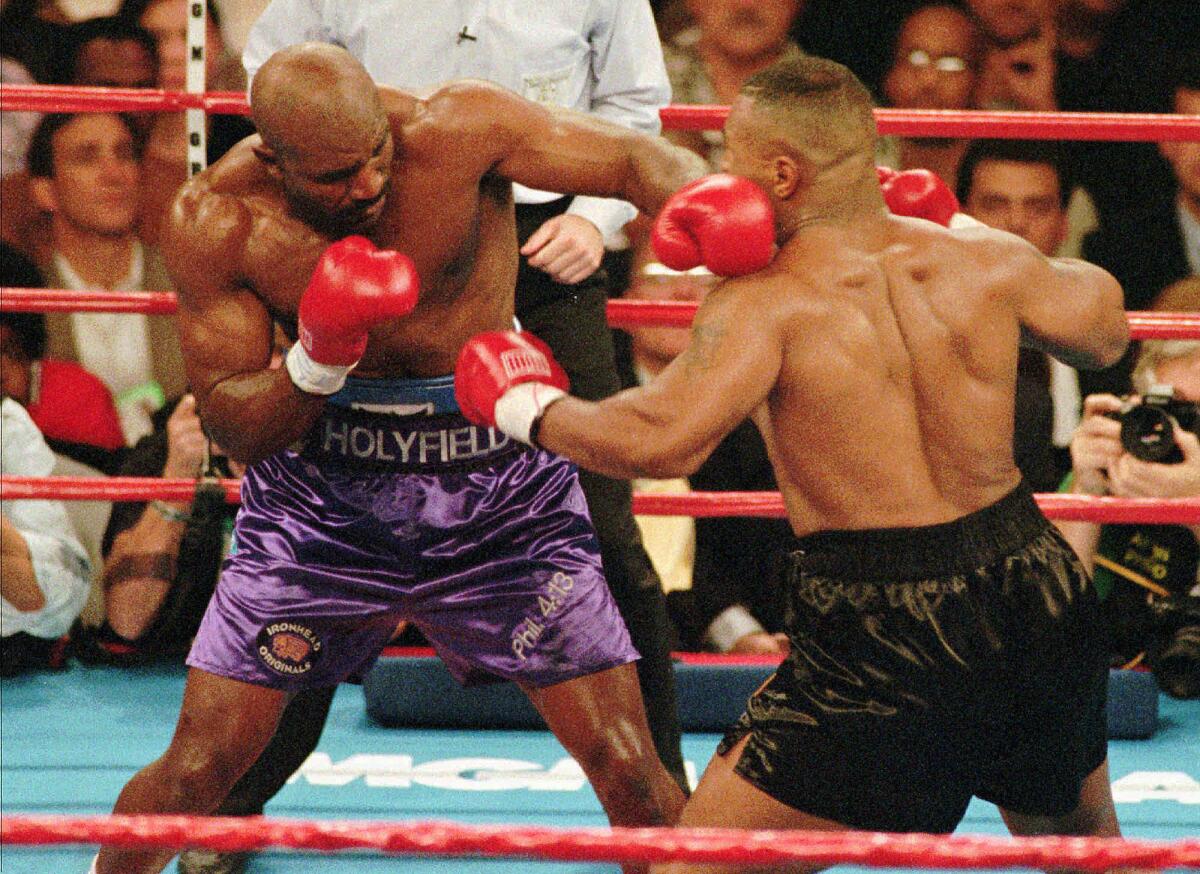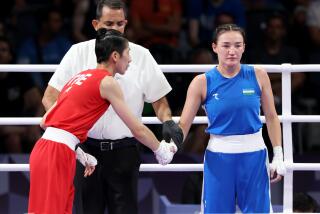Evander Holyfield looks to come to terms with Mike Tyson in new documentary

Evander Holyfield, left, lands a punch to the head of WBA heavyweight champion Mike Tyson at the MGM Grand Garden in Las Vegas. Holyfield went on to defeat Tyon with a TKO in the 11th round.
Reporting from NEW YORK — Few athletes have been as defined by their rival as Evander Holyfield. The Georgia native was an Olympic medalist and won the heavyweight title no fewer than four times.
Yet as the new ESPN “30 for 30” film “Chasing Tyson” makes clear even before it begins, Holyfield would be a far lesser-known commodity if not for Iron Mike, and in fact may not be that well-known even with him.
“I’m still on the road with, ‘How in the world is it that he didn’t do anything and he’s still so popular?’” Holyfield said of Tyson at a cafe Wednesday in ESPN’s offices here. “How many other people could act the way he acted — even going to jail was a big story — and get that attention? I’ve never seen someone black do something wrong like that and get that kind of exposure.”
SIGN UP for the free Indie Focus movies newsletter >>
You couldn’t script television as rich as the Holyfield-Tyson saga. There’s of course the famous ear-chomp incident of 1997, well-known to people who otherwise had never seen a minute of a prizefight. But the drama started long before any acts of auricular avarice.
The youngest of nine children from a poor Southern family, Holyfield was well on his way to becoming the heavyweight champion in the late 1980s, a classic boxer-puncher who at one point would rack up a record of 28-0. Only one person stood in his way of ruling the division in the 1990s: Tyson.
The stage seemed set for a bout between the two. But a series of extenuating circumstances intervened, nearly all of them involving one side of the pairing: Tyson was injured, Tyson was defeated by Buster Douglas, Tyson was sent to jail on rape charges.
The film, which held a premiere here Wednesday night and will air on ESPN Nov. 10, covers the events from both sides, drawing from footage and commentary of the time. It’s a pointed contrast: a low-key, workmanlike boxer going about his title quest as one of the most colorful athletes in American history makes headlines with his exploits.
“Evander Holyfield can’t get a line written about him,” says commentator Alex Wallau in a clip. “He’s a very competent, outstanding athlete, but he doesn’t say much and he’s not very compelling. He’s not beating up Robin Givens and not doing all those things that make the tabloids.”
Or as fellow sportscaster Jim Gray notes, “People don’t gravitate toward calm. Everybody goes to look at the hurricane.”
Holyfield, meanwhile, is seen trying to maintain his poise. “My goal has never been to fight Mike Tyson; my goal has always been to be heavyweight champion of the world,” he says at one point in the film.
By late 1996, Holyfield would fight Tyson. He would upset him, winning the belt by TKO in the 11th round. Seven months later they would battle again, this time in the infamous “Bite Fight.”
Many viewers of the movie, which is directed by Steven Cantor, will remember Holyfield’s mix of surprise and equanimity in the moment of the in-ring attack. As it turns out, more complicated thoughts were running through his mind.
“The thing is, I always remind people I came from the ghetto,” he said in the interview. “It’s not like my mama said, ‘Don’t do bad things.’ She’d say, ‘If they do it to you, you do it back harder.’”
The reason he restrained himself was that a corner man had reminded him that it would have been a sin against God. “I wanted to trip him up and bite the daylights out of him until I heard that,” Holyfield said.
He also believed, he added, that “that could have ended the game of boxing. You’ve got the two top fighters and they’re mauling each other. Once I thought of that I knew I couldn’t do it. With one act I could save the game of boxing.” (Holyfield would of course later publicly forgive Tyson for the incident, and the two also shot a Foot Locker commercial.)
By showing the dynamic of two talented antagonists who were temperamental opposites, “Chasing Tyson” offers a kind of timeless tale, the stuff of stories from the Bible to Marvel movies. Holyfield was the only true foil for the brash heavyweight champion, a role Tyson knew about and was happy to revel in.
Of course, Holyfield recognizes the irony that, even as he gets his “30 for 30” moment, it is primarily because of Tyson. Indeed. the movie spends plenty of time on Iron Mike’s troubles and stops the Holyfield story before such chapters as his controversial bouts with Lennox Lewis.
But the boxer says that he’s tried to make peace with how everything unfolded with Tyson.
“I’m not mad, I’m not envious,” he said. “My mama said, ‘You don’t judge.’ I look at Mike and he had people beating him up when he was little. I can’t judge.”
Holyfield, now 53, continued fighting well past the age when most athletes have hung it up, and well past when many boxing pundits thought he should be getting in the ring too. (His last fight, against the similarly long-toothed Brian Nielsen, came just four years ago.) He said he still felt he had something to give and only realized more recently it was time to move on.
“I live a good life, that’s the big thing. If I didn’t have boxing, what would my life have been like? I had no money when I was a kid and I couldn’t read or write that well. I wasn’t picked first for anything in school. My mama said, ‘You do what you’re good at and you’ll find peace.’ So that’s what I’ve tried to do.”
More to Read
The complete guide to home viewing
Get Screen Gab for everything about the TV shows and streaming movies everyone’s talking about.
You may occasionally receive promotional content from the Los Angeles Times.







